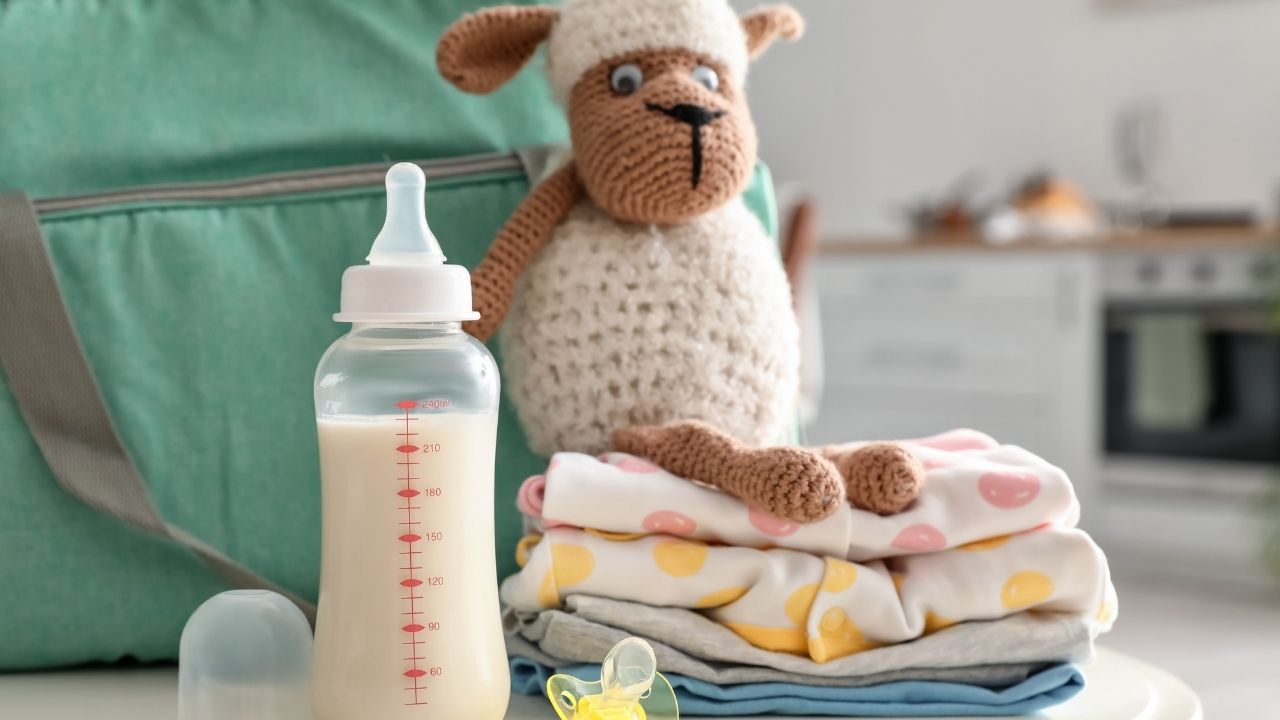Have you ever wondered about the vast potential of your baby's growth and development? As a parent, it's natural to want to provide the best possible environment for your child to thrive in. But with so much information out there, it can be overwhelming to know where to start.
Understanding and nurturing your baby's growth and progress is crucial for their future success. In this article, we'll explore the key aspects of your baby's developmental needs and provide practical tips on how to create a safe and stimulating environment that supports their cognitive and emotional growth. By unlocking your baby's potential, you can set them up for a lifetime of success and fulfillment. So let's dive in!
Understanding Your Baby's Developmental Needs
Get ready to discover what your little one really needs in terms of their growth and development. As a parent, it is imperative to understand the various baby milestones that your child will go through as they grow up. A baby's first year is full of significant developmental milestones, as they transition from being completely dependent on you to exploring their surroundings.
It's important to note that every baby develops at their own pace, and no two babies are alike. However, understanding these critical developmental milestones can help ensure you are providing the best environment for your baby's growth and progress. Some of these key milestones include physical changes such as rolling over, sitting up unassisted, crawling, walking and talking. These changes happen in a particular sequence but may occur at different times for each individual child. By monitoring these stages closely, parents can identify any potential delays early on and seek appropriate interventions if needed.

Creating a Safe and Stimulating Environment
Well, ain't it just swell to know that your little one needs a safe and fun place to grow and learn? As a parent, it's important to create an environment that is both stimulating and secure for your baby. Here are some tips on how to design a sensory-rich nursery and babyproof your home:
Use colors: Babies respond well to bright, bold colors. Paint the nursery walls with vibrant shades or add colorful accents throughout the room.
Add texture: Incorporate different textures into the nursery décor such as soft blankets, fluffy rugs, smooth wooden toys, or rough textured fabrics.
Provide stimulation: Hang mobiles over the crib or add wall decals with interesting shapes and patterns that stimulate visual development.

Babyproofing Tips: Install safety gates at the top and bottom of stairs, cover electrical outlets with outlet covers, attach furniture securely to walls, keep small objects out of reach of babies.
Creating a safe and stimulating environment not only helps your baby's growth but also gives you peace of mind knowing they're in a secure space. Next up, we'll discuss ways you can bond with your little one as they continue to develop.
Bonding with Your Baby
- Skin-to-skin contact is a crucial aspect of bonding with your baby as it promotes physical and emotional closeness, regulates their body temperature and heart rate, and stimulates the release of hormones that promote relaxation and attachment.
- Communicating with your baby involves more than just talking or singing to them; it includes responding to their cues, facial expressions, and body language, as well as engaging in eye contact, touch, and play.
- Building trust and security is fundamental for your baby's healthy development as it creates a sense of safety, predictability, and stability that fosters their social-emotional growth and resilience throughout life.
The Importance of Skin-to-Skin Contact
Skin-to-skin contact is an essential part of early attachment between parents and their newborns. Also known as Kangaroo care, this practice involves placing a baby directly on the chest of a parent or caregiver, with skin-to-skin contact facilitating physical and emotional connection. While this technique is especially crucial for premature infants who require extra care, it has been shown to benefit all babies.
The benefits of skin-to-skin contact extend beyond just bonding; research shows that it can also help regulate a baby's breathing and heart rate, improve their sleep patterns, reduce crying and stress levels, boost immunity, and aid in weight gain. Moreover, it can provide psychological comfort for both parent and child by releasing endorphins that promote feelings of calmness and relaxation. By engaging in regular sessions of kangaroo care with your baby from birth onwards, you can build a foundation for strong attachment while also promoting optimal health outcomes.

As important as it is to establish a strong bond through physical touch during infancy, communication is equally critical in fostering your baby's growth and progress.
Communicating with Your Baby
To help build a strong bond with your little one, it's important to communicate often and openly. This goes beyond simply talking to your baby in a high-pitched voice, known as "baby talk." In fact, using real words and phrases can actually be more beneficial for their language development. Here are some techniques to consider when communicating with your baby:
- Respond promptly to their cries or other nonverbal cues, such as facial expressions or body movements.
- Use eye contact and touch to show your attention and affection.
- Repeat sounds or words they make to encourage communication.
- Narrate daily activities, such as diaper changes or feeding, to introduce new vocabulary.
Interpreting nonverbal cues is also an important aspect of communication with your baby. For example, if they turn away from you during playtime, they may be indicating that they need a break or are feeling overstimulated. Paying attention to these signals can help you respond appropriately and build trust with your little one. By fostering open communication from the start, you can establish a foundation for building trust and security in your relationship with your baby.
Building Trust and Security
You can create a strong connection with your little one by building trust and security through open communication and attentive responses to their nonverbal cues, like a key that unlocks the door to a meaningful relationship. Building trust and security means that your baby feels safe, loved, and cared for. To accomplish this, establishing routines is crucial. Babies thrive on routine because they help them feel secure in knowing what comes next. When you establish regular patterns of feeding, sleeping, and playtime, your baby learns to anticipate these activities which helps them feel more relaxed and content.

In addition to routines, caregiver consistency is also important for building trust and security. Your baby needs to know that you will be there for them when they need you. Consistency in caregiving helps babies feel secure because they learn to rely on their caregivers for comfort and support. This means it's essential that you respond promptly and consistently when your baby cries or signals distress. By doing so, you're sending a message that you care about their well-being which promotes feelings of safety and security in your child. With this foundation of trust established early on, supporting your baby's cognitive development becomes easier as they grow older.
Supporting Your Baby's Cognitive Development
- To support your baby's language development, it's important to talk to them frequently and use proper grammar and vocabulary. This helps expose them to a variety of words and sentence structures which can aid in their cognitive development.
- Encouraging curiosity and creativity involves providing your baby with stimulating toys and activities that promote exploration, problem-solving, and imaginative play. This can help foster their natural desire to learn about the world around them.
- Promoting problem-solving skills can be done by allowing your baby to explore different solutions on their own, rather than intervening immediately when they face a challenge or obstacle. This helps build resilience and critical thinking skills that will benefit them as they grow older.
Language Development
As your little one grows, they'll start babbling and making sounds that will eventually turn into words. This is when language development starts to take place, and it's important for parents to support this growth through play-based learning and a language-rich environment. Here are four ways you can nurture your baby's language skills:
Talk to them often: Even if they don't understand everything you're saying, talking to your baby helps them learn the rhythm and patterns of language.
Read together: Reading books with your little one is a great way to expose them to new words and concepts.

Sing songs: Singing helps babies develop their listening skills and exposes them to different rhythms and tones.
Encourage multilingualism: If you speak more than one language at home, continue using both languages with your child. Research shows that bilingual children have better cognitive abilities than monolingual children.
By providing a stimulating environment for your baby's language development, you're setting the foundation for successful communication skills in the future. The benefits of promoting multilingualism go beyond just communication; it also enhances cognitive flexibility and problem-solving abilities later in life. In the next section, we'll discuss how encouraging curiosity and creativity can further help unlock your baby's potential.
Encouraging Curiosity and Creativity
Get ready to witness your little one's imagination soar as you explore the ways in which you can foster their curiosity and creativity. Fostering independence is a key factor in building your child's confidence and encouraging them to be curious. Give them the flexibility to make choices and decisions, even if it means they will make mistakes along the way. This will teach them valuable life skills such as problem-solving, risk-taking, and critical thinking.

Exploring new experiences is another great way to promote curiosity and creativity in your little one. Introduce them to different environments, animals, cultures, and people that they may not have had exposure to before. This can be as simple as taking them on trips or tours around your city or town or trying out new activities with them like baking or crafting. Encourage their questions about what they observe in these new situations so that they learn how to think outside of the box and come up with unique ideas on their own.
As you nurture your baby’s curiosity through fostering independence and exploring new experiences, you are also helping them develop important problem-solving skills that will benefit them throughout their lives. In the next section, we'll delve deeper into ways you can continue this progress by promoting more advanced problem-solving strategies for your growing child.
Promoting Problem-Solving Skills
Ready to watch your little one conquer complex problems with ease? Encouraging problem-solving skills is an essential component of nurturing your baby's growth and progress. Problem solving games are a great way to foster this skill, as they encourage children to think critically and creatively while having fun.
As your baby grows, it's important to gradually increase the complexity of the games you play together. Start with simple puzzles or shape sorters and work up to more challenging activities that require multiple steps or involve real-world problems. Be sure to praise your child's efforts along the way, even if they don't get the answer right on the first try. This will help build their confidence and encourage them to keep trying until they succeed. Additionally, encouraging independence by allowing them time to solve problems on their own can also promote problem-solving skills as well as self-esteem. Ultimately, these strategies can help your child develop into a confident problem solver who is ready for any challenge that comes their way.

Now that you've learned some advanced techniques for promoting problem-solving skills in your little one, let's explore how nurturing emotional development can further support their overall growth and progress.
Nurturing Your Baby's Emotional Development
You can help your little one thrive emotionally by tuning in to their needs and responding with care and affection. Emotional regulation is a crucial skill that babies develop through secure attachment with their caregivers. By consistently meeting your baby's basic needs for food, warmth, and attention, you lay the foundation for a strong sense of security.
Here are three ways to nurture your baby's emotional development:
- Practice responsive caregiving: Respond promptly to your baby's cries and cues. This helps them feel safe and secure in their attachment to you.
- Create a positive environment: Surround your baby with loving words and actions, play soothing music, use gentle touch during feeding or diaper changes.
- Model healthy emotions: Babies learn by watching those around them. Show them how to express emotions in healthy ways like talking about feelings or taking deep breaths when upset.
By building a strong foundation for emotional development early on, you can help set up your child for success later in life. Next, let's look at monitoring your baby's progress towards developmental milestones so that you can continue supporting their growth and progress.

Monitoring Your Baby's Progress
It's important to keep track of how your little one is developing so that you can continue providing the support they need to reach their full potential. Setting milestones is a great way to monitor your baby's progress. Milestones are specific skills that most babies learn by a certain age range, such as rolling over or saying their first words. By tracking these milestones, you can ensure that your baby is on the right track and developing at a healthy pace.
However, it's also important to recognize developmental delays and seek professional help if needed. Developmental delays refer to when a child does not reach certain milestones within the expected timeframe. Early intervention is crucial in addressing developmental delays, as it can prevent long-term issues and improve outcomes for children. As a parent, it may be difficult to identify these delays on your own, which is why regular check-ups with pediatricians are recommended. Keep in mind that every child develops at their own pace and reaching milestones may vary from child to child. However, keeping an eye out for any potential red flags can help ensure your baby receives the best care possible for optimal growth and development.
Frequently Asked Questions
What are some common myths about baby development that we should be aware of?
Debunking myths and common misconceptions about baby development is essential for parents. One of the most significant misconceptions is that babies can’t learn from birth. In reality, infants begin to learn immediately after birth, and their brains are wired to absorb information from the world around them. Another myth is that babies need constant stimulation to develop correctly. While it’s true that engaging with your baby through playtime and talking helps their development, too much stimulation can actually be overwhelming for your little one. Lastly, some believe that milestones should be reached at a specific age. However, every child develops at their own pace, so comparisons aren't helpful or necessary. By understanding these debunked myths, you can better understand your baby's development and provide appropriate support as they grow and progress.
How can parents and caregivers promote physical development in their babies?
To support your baby's physical development, it's important to incorporate tummy time and sensory play into their routine. Tummy time allows babies to strengthen their neck and back muscles, which are crucial for sitting up and crawling. Sensory play involves exposing your baby to different textures, sounds, and sights, which can help develop their senses and cognitive skills. You can incorporate sensory play through activities such as playing with toys of different shapes and sizes or providing objects with varying textures for them to touch. Remember to always supervise your baby during tummy time and sensory play activities.

What are some warning signs that a baby may be experiencing developmental delays?
If you notice that your baby is not reaching developmental milestones, it's important to seek help early on. Early intervention can make a big difference in addressing any delays and ensuring that your child reaches their full potential. Some warning signs of developmental delays include not being able to hold up their head by three months old, not rolling over by six months old, and not crawling or walking by one year old. Other indicators may include a lack of eye contact, difficulty with feeding or swallowing, and delayed speech development. Don't hesitate to talk to your pediatrician if you have concerns about your baby's development - they can refer you to specialists for further evaluation and support. Remember: seeking help early can give your baby the best chance for success in the long run.
How can parents and caregivers ensure that their baby is getting enough social interaction?
To ensure that your baby is receiving enough social interaction, it's essential to prioritize playtime activities and encourage verbal communication. Babies learn by interacting with their environment and the people around them, so giving them plenty of opportunities to engage in play with you or other children can help promote healthy development. Additionally, talking to your baby regularly helps them develop language skills and fosters socialization. Remember that babies are constantly learning and growing, so make sure to provide a nurturing environment where they can thrive socially. By prioritizing playtime activities and emphasizing the importance of verbal communication, you can help set the foundation for your baby's future social development.
What are some effective strategies for managing a baby's sleep schedule?
As a parent or caregiver, ensuring your baby gets enough sleep is essential for their growth and development. Sleep training techniques can be effective in establishing a bedtime routine to help your baby fall asleep faster and stay asleep longer. It's important to be consistent with the routine and avoid deviating from it too much. Dealing with sleep regressions can be challenging, but adjusting nap schedules can help alleviate some of the issues. Remember that every baby is different, so what works for one may not work for another. Patience, consistency, and a willingness to adapt are key in successfully managing your baby's sleep schedule.
Conclusion
Congratulations on taking the first step towards unlocking your baby's potential! By understanding and nurturing your baby's growth and progress, you can ensure that they are reaching their developmental milestones and thriving in a safe and stimulating environment.

As you continue to bond with your baby, remember that every little interaction counts. One mother shared how she would sing to her baby while changing his diaper, creating a special bonding moment that made both of them feel connected. It's these small moments of love and attention that can make all the difference in your baby's emotional development.
Research shows that early childhood experiences have a lasting impact on cognitive abilities and social-emotional functioning later in life. This means that by monitoring your baby's progress and providing opportunities for growth, you are setting them up for success in the future. Just like a gardener tends to their plants, you are cultivating the potential within your child. So keep nourishing them with love, attention, and stimulation- watch them grow into happy, healthy adults one day!
.png)





